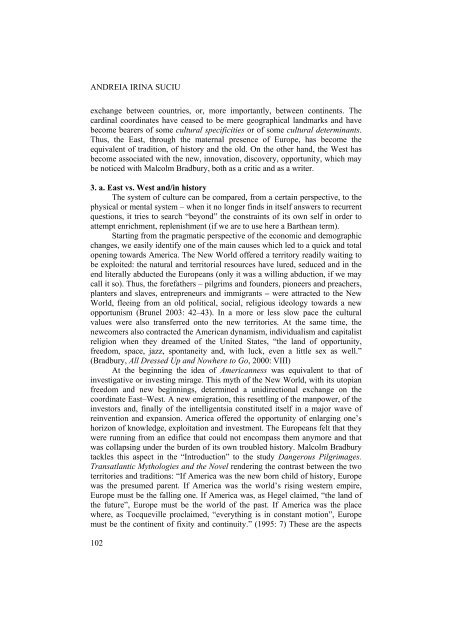culture, subculture and counterculture - Facultatea de Litere
culture, subculture and counterculture - Facultatea de Litere
culture, subculture and counterculture - Facultatea de Litere
You also want an ePaper? Increase the reach of your titles
YUMPU automatically turns print PDFs into web optimized ePapers that Google loves.
ANDREIA IRINA SUCIU<br />
exchange between countries, or, more importantly, between continents. The<br />
cardinal coordinates have ceased to be mere geographical l<strong>and</strong>marks <strong>and</strong> have<br />
become bearers of some cultural specificities or of some cultural <strong>de</strong>terminants.<br />
Thus, the East, through the maternal presence of Europe, has become the<br />
equivalent of tradition, of history <strong>and</strong> the old. On the other h<strong>and</strong>, the West has<br />
become associated with the new, innovation, discovery, opportunity, which may<br />
be noticed with Malcolm Bradbury, both as a critic <strong>and</strong> as a writer.<br />
3. a. East vs. West <strong>and</strong>/in history<br />
The system of <strong>culture</strong> can be compared, from a certain perspective, to the<br />
physical or mental system – when it no longer finds in itself answers to recurrent<br />
questions, it tries to search “beyond” the constraints of its own self in or<strong>de</strong>r to<br />
attempt enrichment, replenishment (if we are to use here a Barthean term).<br />
Starting from the pragmatic perspective of the economic <strong>and</strong> <strong>de</strong>mographic<br />
changes, we easily i<strong>de</strong>ntify one of the main causes which led to a quick <strong>and</strong> total<br />
opening towards America. The New World offered a territory readily waiting to<br />
be exploited: the natural <strong>and</strong> territorial resources have lured, seduced <strong>and</strong> in the<br />
end literally abducted the Europeans (only it was a willing abduction, if we may<br />
call it so). Thus, the forefathers – pilgrims <strong>and</strong> foun<strong>de</strong>rs, pioneers <strong>and</strong> preachers,<br />
planters <strong>and</strong> slaves, entrepreneurs <strong>and</strong> immigrants – were attracted to the New<br />
World, fleeing from an old political, social, religious i<strong>de</strong>ology towards a new<br />
opportunism (Brunel 2003: 42–43). In a more or less slow pace the cultural<br />
values were also transferred onto the new territories. At the same time, the<br />
newcomers also contracted the American dynamism, individualism <strong>and</strong> capitalist<br />
religion when they dreamed of the United States, “the l<strong>and</strong> of opportunity,<br />
freedom, space, jazz, spontaneity <strong>and</strong>, with luck, even a little sex as well.”<br />
(Bradbury, All Dressed Up <strong>and</strong> Nowhere to Go, 2000: VIII)<br />
At the beginning the i<strong>de</strong>a of Americanness was equivalent to that of<br />
investigative or investing mirage. This myth of the New World, with its utopian<br />
freedom <strong>and</strong> new beginnings, <strong>de</strong>termined a unidirectional exchange on the<br />
coordinate East–West. A new emigration, this resettling of the manpower, of the<br />
investors <strong>and</strong>, finally of the intelligentsia constituted itself in a major wave of<br />
reinvention <strong>and</strong> expansion. America offered the opportunity of enlarging one’s<br />
horizon of knowledge, exploitation <strong>and</strong> investment. The Europeans felt that they<br />
were running from an edifice that could not encompass them anymore <strong>and</strong> that<br />
was collapsing un<strong>de</strong>r the bur<strong>de</strong>n of its own troubled history. Malcolm Bradbury<br />
tackles this aspect in the “Introduction” to the study Dangerous Pilgrimages.<br />
Transatlantic Mythologies <strong>and</strong> the Novel ren<strong>de</strong>ring the contrast between the two<br />
territories <strong>and</strong> traditions: “If America was the new born child of history, Europe<br />
was the presumed parent. If America was the world’s rising western empire,<br />
Europe must be the falling one. If America was, as Hegel claimed, “the l<strong>and</strong> of<br />
the future”, Europe must be the world of the past. If America was the place<br />
where, as Tocqueville proclaimed, “everything is in constant motion”, Europe<br />
must be the continent of fixity <strong>and</strong> continuity.” (1995: 7) These are the aspects<br />
102












